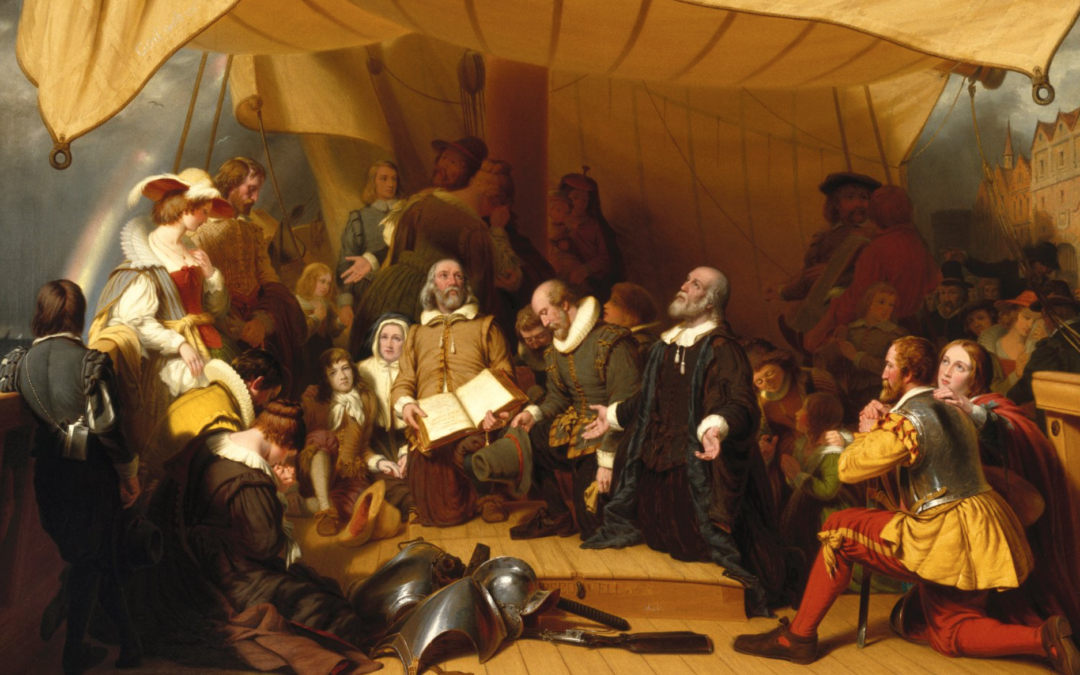I thought of posting what follows as an announcement. Then I thought, why not post it as a Fireside Talk.
Happy Thanksgiving to all of you:
One of my fields of study as an historian is colonial America and the Pilgrims. So every Thanksgiving when my family gathers, I am tasked to read a few lines from Of Plymouth Plantation. This is an account of the first settlement of New England (1620) written by colonial governor William Bradford. Bradford hardly mentions the first thanksgiving meal, but in his account of the Pilgrim arrival on Cape Cod he stresses the hardships the settlers endured crossing the ocean and settling a new land. I’ve copied that account here. Notice how he stresses the physical hardships in order to underscore spiritual blessings. In these trials God sustained the Pilgrims, Bradford writes. So they gave thanks long before their famous Thanksgiving banquet.
In those years and for more than two centuries to follow, Thanksgiving was not a scheduled holiday as it is now, the fourth Thursday of November. It was based instead on a kind of spiritual calendar. When good fortune befell the colony, as in the end of a draught or upon victory in war, a religious and culinary event might be arranged. On the flip side, with bad fortune, such as defeat in battle, a day of Fasting would be called, and the settlers would go without food for a day. (Interesting, isn’t it, that we have pretty much abandoned that part of our national heritage!)
Anyway, during the Fall of 1621, the Pilgrims had their first harvest and accordingly their first Thanksgiving banquet.
Back to William Bradford and the Pilgrim arrival in the New World, here is his description of that moment. This brings us back to the American wilderness and our reading in Roderick Nash for History 453. You will see that the Pilgrims did not particularly cherish wilderness. Fortunately we can continue their holiday without embracing their attitude toward wild nature. See below for a the Bradford text in voice and “print.” (The audible version takes a moment to load.)
“what could they see but a hidious & desolate wildernes”
“Being thus arived in a good harbor and brought safe to land, they fell upon their knees & blessed ye God of heaven, who had brought them over ye vast & furious ocean, and delivered them from all ye periles & miseries therof, againe to set their feete on ye firme and stable earth, their proper elemente…. [But] Being thus passed ye vast ocean,.. they had now no freinds to wellcome them, nor inns to entertaine or refresh their weatherbeaten bodys, no houses or much less townes to repaire too, to seeke for succoure. And for ye season it was winter, and they that know ye winters of yt cuntrie know them to be sharp & violent, & subjecte to cruell & feirce stormes, deangerous to travill to known places, much more to serch an unknown coast. Besids, what could they see but a hidious & desolate wildernes, full of wild beasts & willd men? and what multituds ther might be of them they knew not. What could now sustaine them but the spirite of God & his grace? May not & ought not the children of these fathers rightly say: Our faithers were Englishmen which came over this great ocean, and were ready to perish in this willdernes; but they cried unto ye Lord, and he heard their voyce, and looked on their adversitie, &c. Let them therfore praise ye Lord, because he is good, & his mercies endure for ever.”

Brooklyn Museum – Embarkation of the Pilgrims – Robert Walter Weir

